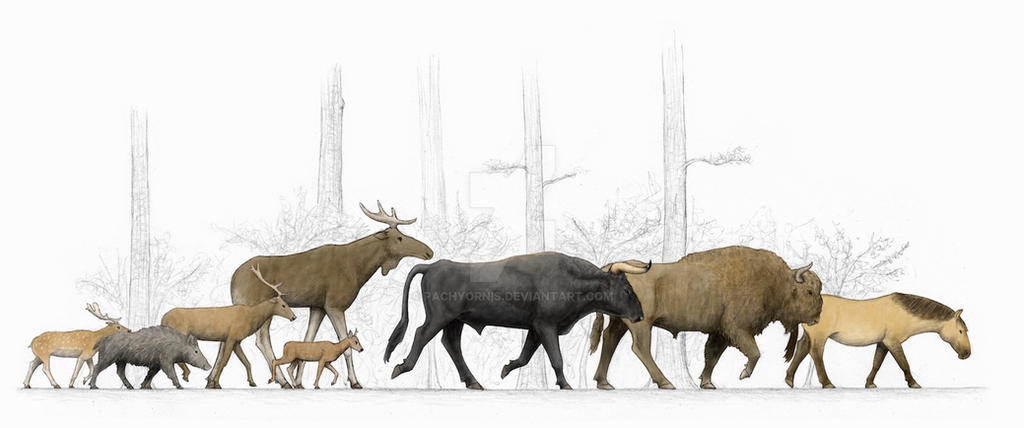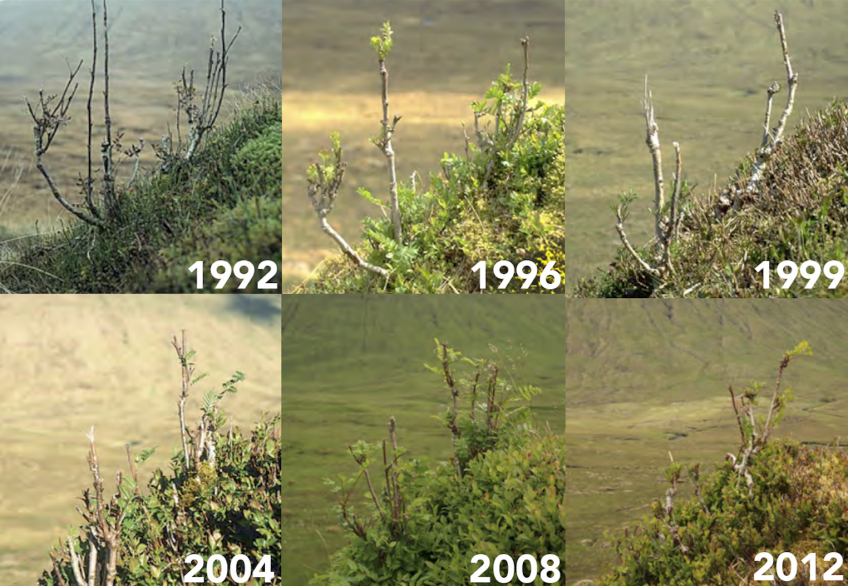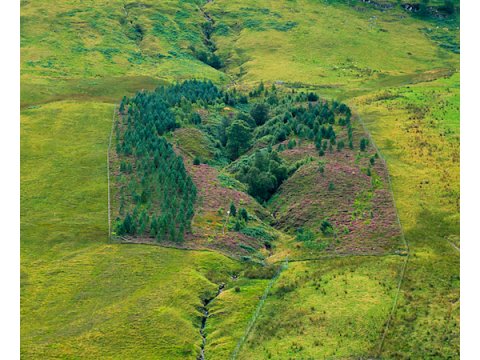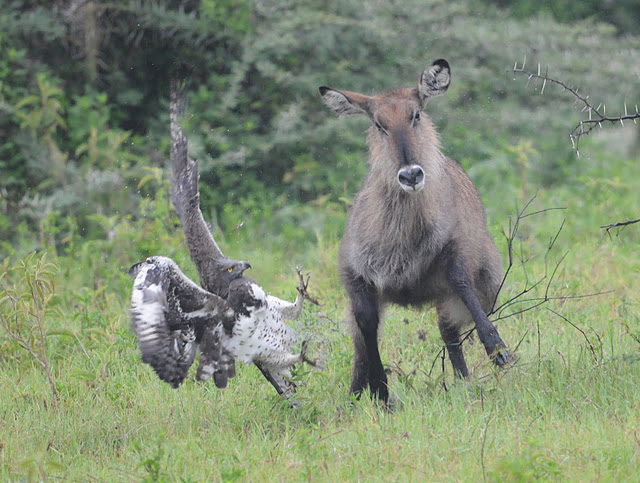At least a few people would know by now that I love nature, I enjoy birdwatching and hiking. I'll spend time at my local wildlife center with my binoculars looking to see a white-tailed deer or a red fox or even just Canada geese. I'm not an avid hunter or fisherman but I spend time with relatives that are and I respect people who hunt for food.
But I always feel kind of unfulfilled. I would love seeing a wilder wilderness in my area and my interest in ancient ecosystems definitely fuels this as well.
To my point however, do you think it will be possible to establish wilderness reserves or national parks in the Western world on the scale of Kruger National Park or the Serengeti National Park?
Now I'm referring more specifically to Europe as it's sort of undergone a much more rapid fauna eradication compared to North America. Aurochs—the wild cattle—and tarpan—the wild horse—along with a baker's dozen other species like wild asses, water buffalo, lions and leopards were all made extinct by human hunters along with local extinctions of wolves, moose, wild boar, muskox, wolverines, etc.
Obviously a main issue comes up with space and conflict with humans, but one solution to this could be erecting 'wildlife fencing' around reserves, similar to what park officials now have to do in some African reserves to prevent lions from wandering into human settlements.
Still though, would that be enough to sway farmers? When you fence up wilderness, is it still wilderness? Is there even enough space to 'create' a wild space?
-
2018-02-08, 02:44 PM #1
European Serengetis and rewilding the West
-
2018-02-08, 02:49 PM #2
-
2018-02-08, 02:49 PM #3
I've heard some talk of large "wildlife corridors" proposed in the US, mainly in the Great Plains. With the idea of introducing certain megafauna equivalent to what once lived in NorthAm. Seems like it would be a multi-decade project to even get started.
-
2018-02-08, 02:51 PM #4
Bring back the T Rex, that would be the only one I really want to see.
 Milli Vanilli, Bigger than Elvis
Milli Vanilli, Bigger than Elvis
-
2018-02-08, 03:03 PM #5
I have heard that Jack Horner (the paleontologist that directed Stephen Spielberg on Jurassic Park) has been trying to get a 'chickenosaurus' or a chicken with dormant genes like teeth, a more dinosaur-like muzzle, leg scales, long tails and unfused wing digits.
Would you settle for a pint-sized clucking dino?
-
2018-02-08, 03:05 PM #6
-
2018-02-08, 03:06 PM #7Deleted
There's a big reserve around chnobyl.
On a serious note I like idea and it could be feasible on the main land but not sure about the UK. We have a bunch of reserves all ready ish national parks really but there as big as we can fit tbh. We reintroduced wild boss down south and some bird species with a plan for wolves that's meeting some resistance in Scotland.
-
2018-02-08, 03:09 PM #8
isn't there one of these in Poland?
i remember cause there was a big fuzz about cutting some old trees because of a bug or something?
found it:
Bialowieza woods
https://www.google.com/search?biw=19....0.SfZum0w9Pk4Last edited by Mteq; 2018-02-08 at 03:12 PM.
This is a signature, there are many like it, but this one is mine.
-
2018-02-08, 03:10 PM #9
-
2018-02-08, 03:14 PM #10
We do have very large National parks now in the US. Not sure how they compare to the size of Kruger or Serengeti parks. But there are several here. In Ohio, we have the large sections of the Wayne National Forest. I have been there in the past and it is hard to imagine such a place in Ohio which is so remote and wild. You can walk for hours there and see no trace of human activity. Also the Salt Fork State park. Not as large as Wayne is, but still some pretty remote sections.
-
2018-02-08, 03:26 PM #11
(Western) Europe is waaaaay too densely populated to have something of that scope. We have smaller national parks of course, but it would be impossible to establish something like african or north american national parks.
Last edited by XDurionX; 2018-02-08 at 03:34 PM.
-
2018-02-08, 03:37 PM #12
Chernobyl may ironically be the wildest place in Europe. Out of the species shown on this, only two are missing: the aurochs and the moose.

I've been keeping track of rewilding in the UK. It seems like some farmers in Scotland are so against the reintroduction of the lynx to the point where it's comical. I was reading article that compared bringing the lynx back to cloning dinosaurs and releasing them into the wild lol.On a serious note I like idea and it could be feasible on the main land but not sure about the UK. We have a bunch of reserves all ready ish national parks really but there as big as we can fit tbh. We reintroduced wild boss down south and some bird species with a plan for wolves that's meeting some resistance in Scotland.
The UK is where I think fenced-in wilderness reserves would be the most beneficial. Wolves, moose, brown bears, lynx, wildcats and wolverines would all benefit the ecology of the British Isles, but it would benefit them and the farmers as well if their migrations into certain areas were halted.
-
2018-02-08, 03:44 PM #13
1, Europe is actually a lot smaller than people think it is. Maps commonly in use don't accurately reflect its real scale.
2, Europe is incredibly densely populated. And perhaps more importantly evenly populated. There's literally no part of Europe ( except a few mountain ranges and Arctic Scandinavia) where you wouldn't be within maximum a day's walking distance from a population center.
3, Even tho population centers aggregate people into a relatively small space the land area required to sustain those places is extensive. Power grids, arable land and pastures, aquifers, water reservoirs, roads and even wooded areas. This means that even what appears to be "uninhabited land" is in reality managed land.
There are plenty of wildlife reserves around Europe, but there isn't much space for any significant megafauna. Especially not predatory.
-
2018-02-08, 03:44 PM #14Deleted
Yea I watched a documenty on chynobal as it is now and it's worked out as a big book for wildlife who don't seem to bothered by the radiation and are flourishing without humans. I'd like to see wolves return and bears and our vast forest regrown once all of England was a forest befor we needed ships but I'm a realist we already get hysterical about fox bites so fenced enclave's would be the way to go
-
2018-02-08, 05:16 PM #15
Yeah, @adam86shadow was telling me about fox attacks. No offence, from an American perception it just sounds kind of comical. Most foxes around my area will flee at the sight of a human, even small children.
-
2018-02-08, 05:34 PM #16Deleted
It would be nice unfortunately I feel practicality wise it would be too difficult. That said we do have wildlife reserves just not ones as large as Africa.
-
2018-02-09, 12:37 PM #17Mechagnome


- Join Date
- Jan 2012
- Posts
- 656
Best bet is to do what the Netherlands do, making wildlife bridges to connect a multitude of smaller sized national parks, to create a big enough one to get predators back to the Netherlands.
We have a huge deer problem, they are running amok and we have to shoot an x amount of them every year to keep the population in check. Natural predators would ideally do the work for us.
It's actually a bit more complicated as just creating enough room for them to return though. Wolves are pack animals and they won't create a new pack until the old ones grows so big that it cannot sustain itself anymore with food.
We would need wolves to return from Germany, there are quite a few wolf packs remaining there - but they haven't grown big enough nor will they run out of food anytime soon. They have the same Deer (and Rabbit) issue as we have over here. So the wolves are happy there, no need to move over here. Sometimes a stray or kicked out male will wander over and usually gets hit by a car at some point.
Dealing with Farmers is actually the easiest part. EU simply compensates them for any dead sheep and so on due to wolf attacks. They already do that over here and they kinda get a little more money as getting new sheep would cost so it's even a "good deal" for them.
Though you did kinda mention it - if you want to go somewhere in Europe where you can do a multiple day hike without any civilization around apart from some other hikers - Iceland is your destination My DK
My DK
(retired since januari 2017) solely playing PoE now.
-
2018-02-09, 01:29 PM #18
Wolves are great predators of deer, if Yellowstone is any indication. When wolves we're brought to Yellowstone they actually modified the behavior of the elk and other deer species to where they would actively avoid open areas of the park. Because of this the plants in those areas started increasing and that attracted birds and beavers, which built dams that created pools for otters, fish and muskrats. The wolves killed coyotes and the number of small rodents increased which increased the number of weasels, badgers, etc.
In Scotland (Caledonian Forest, specifically), red deer extensively overgraze/browse to the point that trees are unable to properly grow.


It's actually gotten to the point where they have to fence in patches of trees for them to even grow normally.Last edited by Techno-Druid; 2018-02-09 at 01:32 PM.
-
2018-02-09, 01:34 PM #19Deleted
No, not without costing hundreds of billions in relocation costs.
Serengeti and Kruger National Park are the size of small European countries. The least densely populated area of that size that I could find in Europe lies in Spain, and it still contains a million people. And that's a best case scenario. Typical areas of that size in Europe would contain somewhere between 1 to 10 million people. In the densest populated areas, we're speaking 10 to 25 million people, easily. No matter where you place an area like that in Europe, it will always contain several dozen medium sized cities (100k+) and a handful of large cities (500k+).
While you could argue that cities can exists as island withing such a larger space, the economic reality is that this would devastate those cities' local economies and force its inhabitants to move out of them anyway. Either way, it would cost a massive amount of money to evacuate everyone from those areas, while trying to find new homes for millions of people would be a demographic and political nightmare, even if you phase it over decades.
Europe contains 750 million inhabitants on barely 6.5% of the world's land mass, of who about 625 million live in just half that area (while the rest live in European Russia and the Caucasus).Last edited by mmoc38da5ea66c; 2018-02-09 at 01:46 PM.

 Recent Blue Posts
Recent Blue Posts
 Recent Forum Posts
Recent Forum Posts
 Dragonflight Season 4 - Awakened Raid Rotation and Rewards
Dragonflight Season 4 - Awakened Raid Rotation and Rewards MMO-Champion
MMO-Champion


 Reply With Quote
Reply With Quote





